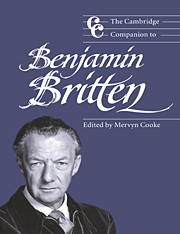Book contents
- Frontmatter
- Introduction
- Part one Apprenticeship
- 1 Juvenilia (1922–1932)
- 2 Britten, Auden and ‘otherness’
- 3 Britten in the cinema: Coal Face
- Part two The operas
- 4 ‘He descended into Hell’: Peter Grimes, Ellen Orford and salvation denied
- 5 The chamber operas
- 6 Gloriana: Britten's ‘slighted child’
- 7 Britten and Shakespeare: A Midsummer Night's Dream
- 8 Eros in life and death: Billy Budd and Death in Venice
- Part three Perspectives
- Part four The composer in the community
- Notes
- Index of Britten's works
- General index
6 - Gloriana: Britten's ‘slighted child’
from Part two - The operas
Published online by Cambridge University Press: 28 September 2011
- Frontmatter
- Introduction
- Part one Apprenticeship
- 1 Juvenilia (1922–1932)
- 2 Britten, Auden and ‘otherness’
- 3 Britten in the cinema: Coal Face
- Part two The operas
- 4 ‘He descended into Hell’: Peter Grimes, Ellen Orford and salvation denied
- 5 The chamber operas
- 6 Gloriana: Britten's ‘slighted child’
- 7 Britten and Shakespeare: A Midsummer Night's Dream
- 8 Eros in life and death: Billy Budd and Death in Venice
- Part three Perspectives
- Part four The composer in the community
- Notes
- Index of Britten's works
- General index
Summary
Gloriana was conceived during a skiing holiday Britten spent with Peter Pears and the Harewoods in March 1952. In his memoirs, the Earl of Harewood recalls an aprés-ski discussion of great national operas, amongst them Smetana's The Bartered Bride, Musorgsky's Boris Godunov, Wagner's Die Meistersinger and, above all, Verdi's Aida, which Britten cited as ‘the perfect expression of every kind of nationalist feeling, national pride’. When it was pointed out that no such work existed in the English repertory, the answer seemed obvious – he would have to write one. Given that Elizabeth II had just acceded to the throne, it was natural for a composer with Britten's innate sense of occasion (and practicality) to suggest that this opera should be part of the forthcoming Coronation celebrations. It was then almost inevitable that the subject should be the first Queen Elizabeth, although Henry VIII was considered, and rejected, before the decision was made. By the time the holiday was over, Britten had already chosen as his source Lytton Strachey's Elizabeth and Essex: A Tragic History, which the Earl had recently read, and settled on his preferred librettist – William Plomer, with whom he was currently working on ideas for children's operas. Within a few weeks, royal approval had been given to the scheme and funding had been promised – at that stage either directly from the Treasury or from Covent Garden – and things seemed set fair for another major triumph for Britten and for British opera. Few could have predicted the storm of critical abuse that would ensue.
- Type
- Chapter
- Information
- The Cambridge Companion to Benjamin Britten , pp. 113 - 128Publisher: Cambridge University PressPrint publication year: 1999
- 1
- Cited by

